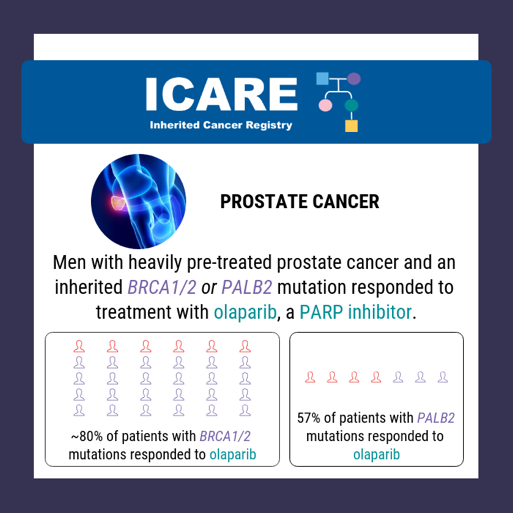 There is now information to suggest that identifying inherited mutations in DNA repair genes, such as BRCA1/2 and other genes, in men with metastatic prostate cancer may open doors for other treatment options. Results of a phase 2 clinical trial among men with metastatic and heavily pre-treated prostate cancer were presented at the American Society of Clinical Oncology 2019 meeting.1 Mateo and colleagues found that treatment with a PARP inhibitor (olaparib) was promising among those with BRCA1/2 mutations (24 of 30 patients) and PALB2 mutations (4 of 7 patients), while patients with other inherited genes also showed some response.1 Another recent study suggested that men with metastatic prostate cancer and a BRCA2 mutation who received androgen blockers for their initial treatment had better outcomes compared with those who received taxanes.2 This suggests that BRCA2 status may guide initial treatments among metastatic prostate cancer patients.2
There is now information to suggest that identifying inherited mutations in DNA repair genes, such as BRCA1/2 and other genes, in men with metastatic prostate cancer may open doors for other treatment options. Results of a phase 2 clinical trial among men with metastatic and heavily pre-treated prostate cancer were presented at the American Society of Clinical Oncology 2019 meeting.1 Mateo and colleagues found that treatment with a PARP inhibitor (olaparib) was promising among those with BRCA1/2 mutations (24 of 30 patients) and PALB2 mutations (4 of 7 patients), while patients with other inherited genes also showed some response.1 Another recent study suggested that men with metastatic prostate cancer and a BRCA2 mutation who received androgen blockers for their initial treatment had better outcomes compared with those who received taxanes.2 This suggests that BRCA2 status may guide initial treatments among metastatic prostate cancer patients.2
1Mateo, et al. J Clin Oncol. 2019 May. DOI: 10.1200/JCO.2019.37.15_suppl.5005.
2Castro, et al. J Clin Oncol. 2019 Feb. PMID 30625039.
